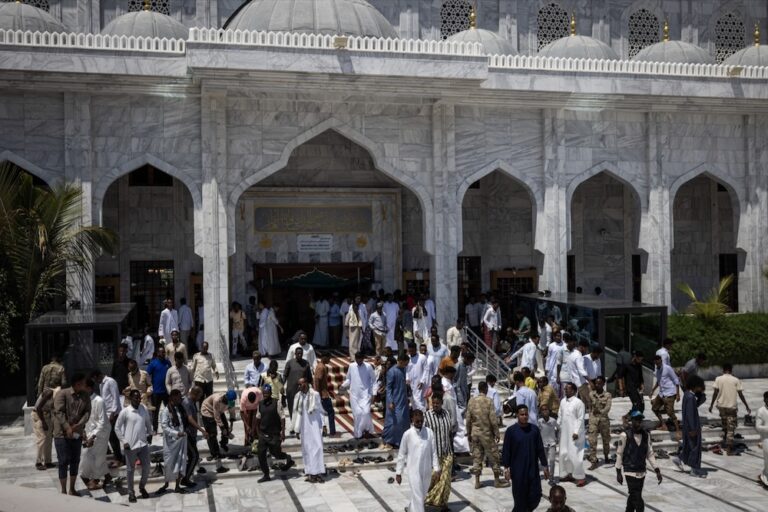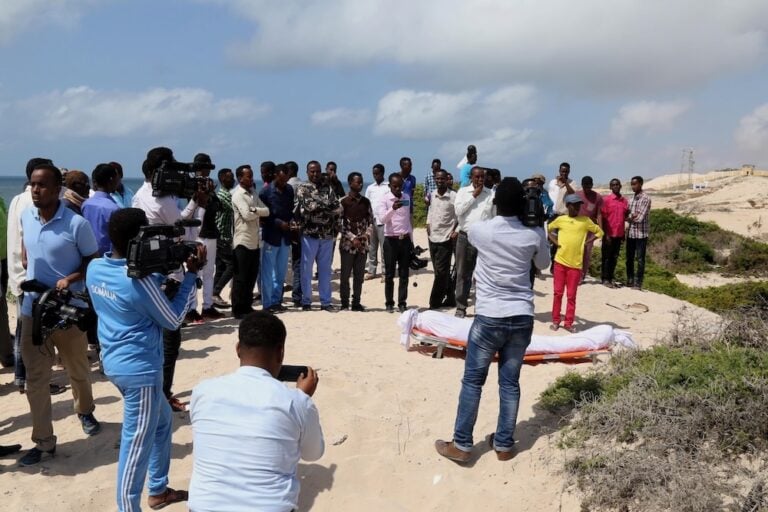(RSF/IFEX) – A video published on an Ethiopian pro-government website on 13 April 2007 includes footage of two Eritrean state TV journalists, cameraman Tesfalidet Kidane Tesfazghi and reporter Saleh Idris Gama, who have been held in secret since their December 2006 arrest in Somalia. “We are certain of their identity and of the fact that […]
(RSF/IFEX) – A video published on an Ethiopian pro-government website on 13 April 2007 includes footage of two Eritrean state TV journalists, cameraman Tesfalidet Kidane Tesfazghi and reporter Saleh Idris Gama, who have been held in secret since their December 2006 arrest in Somalia.
“We are certain of their identity and of the fact that they are professional journalists who were sent to Somalia to work for the TV station that employs them,” Reporters Without Borders said today. “That foreigners, including Eritreans, fought alongside the Union of Islamic Courts and are now prisoners of war is one thing. But Tesfalidet and Saleh were not combatants and should not be used to settle scores between Ethiopia and Eritrea.”
The video is a three-part documentary criticising Eritrea’s involvement in the December 2006 fighting in Somalia alongside the Union of Islamic Courts (UIC). Posted on the Ethiopian pro-government site Waltainfo.com and bearing the copyright of the Ethiopian public TV station ETV, it condemns the presence in Somalia of “foreign fighters” who were captured by the Ethiopian and Somali armies.
With commentary that is very critical of Eritrean President Issaias Afeworki, the documentary uses interviews with Eritrean citizens, including the two journalists. Their Eritrean passports are shown and what they say on camera, in Tigrinya, is simultaneously translated into Amharic.
Tesfalidet is shown wearing a blue tracksuit top and “seems tired,” according to one of his friends, now living in exile. He recounts how he was summoned to Asmara airport last December to go on a trip without knowing where. He only realised it was Mogadishu when they landed.
At one point – a remark that is not translated into Amharic by the filmmakers – he describes “laying my camera on the ground” on his arrival in Somalia, and at the same time he mimes putting something down. The interview, filmed while he was held in Ethiopia, is captioned: “Tesfalidet Kidane Tesfazghi, a ‘shabia’ soldier captured during the war.” Shabia literally means “popular,” but it is used as a nickname for the Eritrean regime.
His exiled friend told Reporters Without Borders: “Tesfalidet Kidane is a staff cameraman with Eri-TV and was imprisoned arbitrarily by the Eritrean government several times, in 2005 and 2006.”
A former Eri-TV journalist now in exile told Reporters Without Borders: “It is not surprising that these journalists were not told what their final destination was. This is standard practice in the public media, when the information ministry wants to maintain secrecy. The same thing happened to me several times, being sent somewhere in the provinces without knowing why.”
He added that the state TV station does not have the resources to broadcast live from outside the country and “probably decided to send a crew to Somalia in anticipation of a UIC victory over the transitional federal government.”
Saleh, who normally presents an Eri-TV news programme on “patriotic” youth, is described in the video as a “lieutenant and brigade administrator, captured during the war in Somalia.” Footage of some of his programmes, in which he is seen wearing an Eritrean uniform, is included in the video. His account is very similar to that of Tesfalidet. In the interview, filmed while he was being held in Ethiopia, he is shown wearing a light-coloured shirt and he seems in good health.


